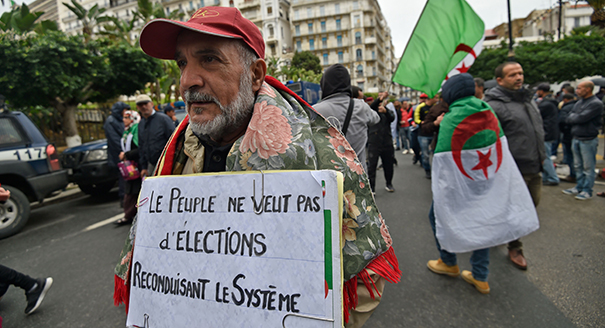Algeria’s presidential election has been scheduled for December 12. However, the protest movement that emerged last February has rejected the idea of an election, arguing it will be neither free nor fair. The movement has pursued aims such as the departure of the remaining political figures who served under former president ‘Abdelaziz Bouteflika, greater freedom for media outlets, and the release of prisoners detained for expressing their political opinions.
Many opposition figures have asked the authorities to meet their demands in order to reassure the public and create a favorable atmosphere allowing popular participation on polling day. Instead, the authorities have tightened their control over media and have sought to impose an election by arresting activists, protesters, journalists, and even a veteran of the War of Independence.
Five candidates, all from the political establishment, will run in the election. Among them, four are former ministers, including two key figures from the Bouteflika era. They are ‘Abdelmadjid Tebboune, who was appointed a minister several times as well as prime minister, and ‘Ali Benflis, another former prime minister and a presidential candidate in 2004 and 2014.
The question is not whether the election is going to take place. That may be a given, since the politico-military leadership cannot lose face again after elections were twice canceled. The question is what will happen after December 12?
The Algerian regime has been resilient, but is faced today with a number of options. It can ignore people’s demands and rely on the exhaustion of the protest movement; or it can resort to coercive measures because the protests are not showing any signs of abating. Alternatively, those in power might adopt a new approach and initiate a serious dialogue with the popular movement instead of trying to fabricate illegitimate consent through force or an election.
Those in power have been unable to respond adequately to the new challenges imposed by the popular movement, which by November 22 had been ongoing for 40 consecutive weeks. The protestors come from a different cultural environment than their political leaders. While the protest movement is asking for postmodern values such as freedom, diversity, transparency, and dignity, the regime is still trying to convince people that elections are the only way forward and the ultimate proof of democracy.
Doubts about those in power are widespread, and the public has been questioning the trust it had placed for decades in the authorities and their institutions. One of the demands on which Algerians have been insisting is the need for citizens to have increased influence over important decisions. Their rejection of a new law on hydrocarbons because it is being passed by Bouteflika-era officials is a case in point. They are asking for a public democracy and rejecting the system in which there was not even a premise of parliamentary debate. That is why, since February, public spaces have proliferated where people can discuss and share ideas about how they see a transition.
For all these reasons, a majority of Algerians refuse to participate in an electoral farce that they perceive as being an effort to reinforce the regime. However, this may not necessarily mean that there will be no popular participation in the election. Even under current circumstances the regime can count on government institutions and the bureaucracy to turn out voters, and it continues to have a social base among the remnants of the ruling National Liberation Front and other parties close to the regime, such as the National Rally for Democracy. These parties, despite their weaknesses, have traditionally been close to and dependent upon state institutions and can still mobilize supporters, albeit modestly.
There is also the fear factor. The regime is always able to rely on citizens who have been influenced by its paranoid discourse, according to which any delay in elections will lead to an “obscure tunnel called a constitutional void.” To that end, the regime can also count on media outlets to promote this rhetoric of fear.
However, despite its traditional backers, the mood of the current political scene suggests the participation level in the presidential election is likely to be very low. The election will not create dynamics resulting in a final break with the present political system. On the contrary, the system will seek to rejuvenate itself by placing in the presidential palace one of ancien regime’s well-known faces, whether Tebboune or Benflis. Many Algerians to whom I spoke described this as “a prolongation of the Bouteflika era without Bouteflika.”
Algeria will end up with a president who will suffer from a lack of legitimacy. This will put him under enormous pressure, caught between citizens who have increased their demands and changed their perception of the institutions and elites governing them and the military who brought him to power.
With such a lack of legitimacy, the president will not be able to meet the political and socioeconomic challenges lying ahead. To gain a modicum of legitimacy he will need to negotiate with the popular movement immediately after the election. However, for this to happen, the popular movement needs to approve of personalities from its ranks to represent it and negotiate on its behalf. The major challenge for the movement will be to decide on its endpoint in time and what would bring this about. In other words what would constitute “victory” for the movement? This question is crucial because no movement can go on endlessly. Either it must define achievable aims or the regime may resort to greater repression or play on the protest movement’s internal divisions to terminate it.








